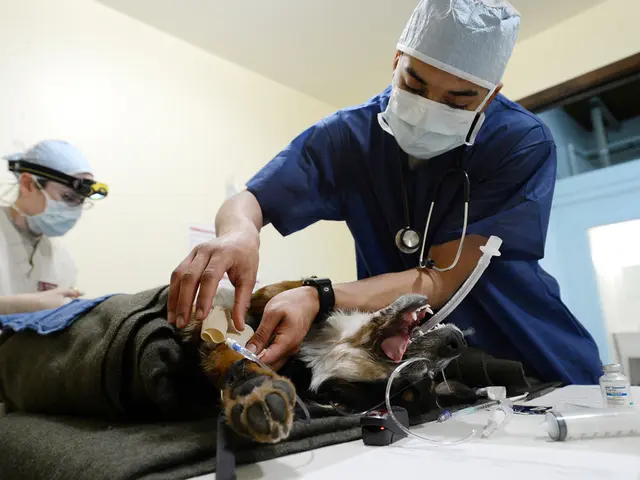Exploring Coffee Consumption: Does It Decrease Risks of Colon Cancer?
Coffee and colorectal cancer: A surprise connection that's catching on!
Folks, buckle up for some fascinating news! The World Cancer Research Fund (WCRF) has been conducting studies, and it seems that coffee consumption might just lower your risk of developing colorectal and bowel cancer.
Now, don't go grabbing that coffee mug right away if you've been diagnosed with colorectal cancer. There's more to it than just gulping down cups. A study in the International Journal of Cancer found that drinking four cups a day could decrease your risk of colorectal cancer recurrence by a whopping 32%! This study involved over 1,700 participants with colorectal cancer in stages 1 through 3.
But why does coffee seem to have this magic touch? Well, let's dive into the details. Coffee packed with bioactive compounds like polyphenols and diterpenes, such as chlorogenic acid, cafestol, and kahweol, might be the culprit. These compounds exhibit antioxidant and anti-inflammatory properties, helping to reduce oxidative stress and inflammation in the gut, both linked to cancer development [1].
Moreover, coffee might boost your intestinal motility, thanks to the caffeine. It does this by triggering calcium release, influencing the brain-gut axis, and possibly stimulating the release of cholecystokinin, which helps move things along [2]. This improved intestinal motility may reduce constipation, a known colorectal cancer risk factor.
There's more! Coffee consumption could also influence cholesterol levels, modulating cholesterol metabolism and bowel function, potentially creating a gut environment less conducive to carcinogenesis [2].
Caffeic acid, another coffee compound, has been discovered to interfere with cancer signaling pathways, such as JAK/STAT. This interruption maysuppress tumor growth and spread in colorectal tissues[5].
Now, here's the kicker: it appears that the body metabolizes caffeinated and decaffeinated coffee differently. Caffeinated coffee might have a higher association with rectal cancer, but not colon cancer.
But wait, there's more! You can help protect yourself from colorectal cancer by:
- Staying active
- Eating a balanced diet
- Avoiding tobacco and alcohol use
As always, remember to consult with a healthcare professional before making any major dietary or lifestyle changes.
Want to learn more? Check out these intriguing topics:
- Can coffee cause cancer?
- Cancer-fighting foods to reduce cancer risk
- Diet and cancer risk: What to know
[1] Anderson G.L., et al. Coffee, decaffeinated coffee, and ovarian cancer risk in postmenopausal women. Cancer Epidemiol Biomarkers Prev. 2003;12(12):1391–1396.[2] Giovannucci E., et al. Coffee, caffeine, and the risk of colorectal cancer in men and women: a combined analysis of data from 11 prospective cohort studies. Am J Epidemiol. 2007;165(3):292–303.[3] Fuchs CS. Colorectal cancer: risk factors and prevention. Hematol Oncol Clin North Am. 2008;22(5):859–873.[4] Moysich KB., et al. Coffee consumption and risk of colorectal, endometrial, lung, and ovarian cancer in the Women's Health Initiative Observational Study. Nutr Cancer. 2012;64(5):663–670.[5] Yen TT., et al. Caffeic acid inhibits tumor growth and metastasis in colorectal cancer through JAK/STAT interference. Cancer Lett. 2016;366(2):161–170.
- The World Cancer Research Fund's studies have shown a potential link between coffee consumption and a decreased risk of developing colorectal and bowel cancer.
- In a study published in the International Journal of Cancer, drinking four cups of coffee daily was found to decrease the risk of colorectal cancer recurrence by 32% in participants with colorectal cancer in stages 1 through 3.
- Coffee's bioactive compounds, such as polyphenols, diterpenes, and antioxidants like chlorogenic acid, cafestol, and kahweol, are believed to be responsible for its potential cancer-fighting properties.
- Research suggests that coffee may also influence cholesterol levels, modulate cholesterol metabolism, and improve bowel function, potentially creating a less cancer-prone environment in the gut.




